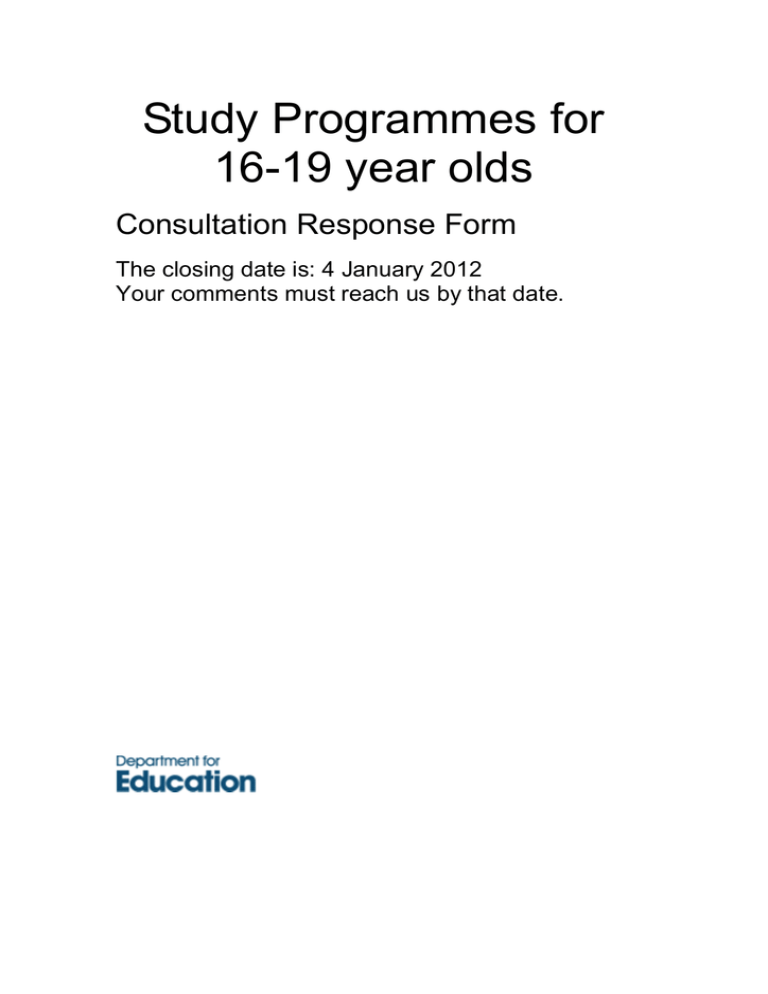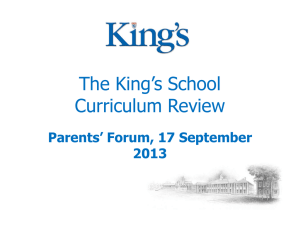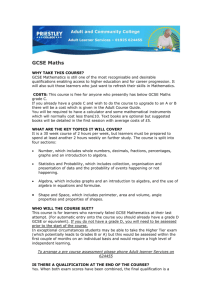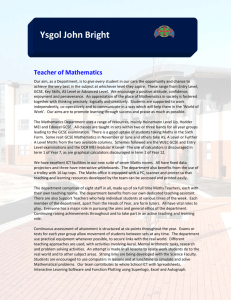Study Programmes for 16-19 year olds Consultation Response Form
advertisement

Study Programmes for 16-19 year olds Consultation Response Form The closing date is: 4 January 2012 Your comments must reach us by that date. THIS FORM IS NOT INTERACTIVE. If you wish to respond electronically please use the online response facility available on the Department for Education website (www.education.gov.uk/consultations). Information provided in response to this consultation, including personal information, may be subject to publication or disclosure in accordance with the access to information regimes, primarily the Freedom of Information Act 2000 and the Data Protection Act 1998. If you want all, or any part, of your response to be treated as confidential, please explain why you consider it to be confidential. If a request for disclosure of the information you have provided is received, your explanation about why you consider it to be confidential will be taken into account, but no assurance can be given that confidentiality can be maintained. An automatic confidentiality disclaimer generated by your IT system will not, of itself, be regarded as binding on the Department. The Department will process your personal data (name and address and any other identifying material) in accordance with the Data Protection Act 1998, and in the majority of circumstances, this will mean that your personal data will not be disclosed to third parties. Please tick if you want us to keep your response confidential. Reason for confidentiality: Name Stella Dudzic Organisation (if applicable) Mathematics in Education and Industry Address: Monckton House, Epsom Centre, White Horse Business Park, Trowbridge, Wiltshire, BA14 0XG If your enquiry is related to the policy content of the consultation you can contact the department on 0370 000 22 88 or by e-mail: wolf.studyprogrammes@education.gsi.gov.uk If you have a query relating to the consultation process you can contact the consultation unit on 0370 000 22 888 794 311 or by e-mail: consultation.unit@education.gsi.gov.uk Please mark an X in one box below that best describes you as a respondent. General FE Colleges (GFEs) Schools with Sixth Forms (SSFs) Local Authorities (LAs) Learner Sixth Form Colleges (SFCs) Independent Private Providers (IPPs) Provider or Stakeholder Organisations Teacher Association Please Specify: Curriculum development organisation for mathematics Academies Independent Specialist Providers (ISPs) Awarding Organisations X Other Q1) Will the measures listed in the consultation document be sufficient to ensure that the 16-19 study programmes principles are followed? Yes X No Not Sure Comments: We welcome the expectation that students who do not have grade A*-C in GCSE Mathematics (and English) will be expected to work towards them. However, we also recognise that students who have failed to achieve a Level 2 GCSE Mathematics qualification are not always best served by resitting the same qualification. Therefore, we endorse Professor Alison Wolf’s view: “GCSE Mathematics for adults has vanished, even though it was highly successful, and recognised that a single approach cannot work for all age groups. I would be delighted to see it re-established.” We are concerned that an expectation that 600 hours a year is sufficient for delivery of most programmes will discourage programmes such as four AS qualifications plus GCSE Mathematics or five AS qualifications; the latter often enables students to take up Further Mathematics. This goes against the principle that providers should have the flexibility to make choices in the best interests of all students. Q2) How will this programme of study need to be tailored for part-time students? Comments: Part time students should be expected to work towards GCSE A*-C in Mathematics and English. Q3) How will the proposals affect different providers? Comments: No comment. Professor Wolf's report stressed the importance of all young people studying English and maths, and particularly achieving A*-C in GCSE English and maths. As part of the implementation of Professor Wolf's recommendations, in the short term we will set out a clear expectation that English and maths must be part of a study programme for those students who have not achieved A*-C in GCSE in these subjects. It is important that providers support as many of their students as possible to achieve at least a C at GCSE as it is the GCSE that offers the best employment prospects and opportunities for progression. In addition, the Secretary of State has signalled his ambition for the vast majority of 16-19 year olds to be studying maths within 10 years. Q4) In line with this ambition for all to be studying maths post-16 in the next decade, we would be interested to know what you feel could be done to encourage more young people who have already achieved GCSE A*-C to study maths. What would this provision look like? Comments: We have written a paper which makes recommendations of ways to encourage more young people with GCSE A*-C to continue with mathematics. This paper is attached with this response and is also available online at www.mei.org.uk Q5) What can we do to simplify areas where colleges/employers have particular concerns offering students opportunities in the workplace, e.g. insurance, health and safety? Comments: No comment Q6) What more can we do to remove barriers to providing high quality internships? Comments: No comment Thank you for taking the time to let us have your views. We do not intend to acknowledge individual responses unless you place an 'X' in the box below. Please acknowledge this reply X Here at the Department for Education we carry out our research on many different topics and consultations. As your views are valuable to us, would it be alright if we were to contact you again from time to time either for research or to send through consultation documents? XYes No All DfE public consultations are required to conform to the following criteria within the Government Code of Practice on Consultation: Criterion 1: Formal consultation should take place at a stage when there is scope to influence the policy outcome. Criterion 2: Consultations should normally last for at least 12 weeks with consideration given to longer timescales where feasible and sensible. Criterion 3: Consultation documents should be clear about the consultation process, what is being proposed, the scope to influence and the expected costs and benefits of the proposals. Criterion 4: Consultation exercises should be designed to be accessible to, and clearly targeted at, those people the exercise is intended to reach. Criterion 5: Keeping the burden of consultation to a minimum is essential if consultations are to be effective and if consultees’ buy-in to the process is to be obtained. Criterion 6: Consultation responses should be analysed carefully and clear feedback should be provided to participants following the consultation. Criterion 7: Officials running consultations should seek guidance in how to run an effective consultation exercise and share what they have learned from the experience. If you have any comments on how DfE consultations are conducted, please contact Carole Edge, DfE Consultation Co-ordinator, tel: 01928 738060 / email: carole.edge@education.gsi.gov.uk Thank you for taking time to respond to this consultation. Completed questionnaires and other responses should be sent to the address shown below by 4 January 2012 Send by post to: Helen O'Neill, Qualifications Policy Division, Level 2, Sanctuary Buildings, Great Smith Street, London, SW1P 3BT Send by e-mail to: wolf.studyprogrammes@education.gsi.gov.uk





